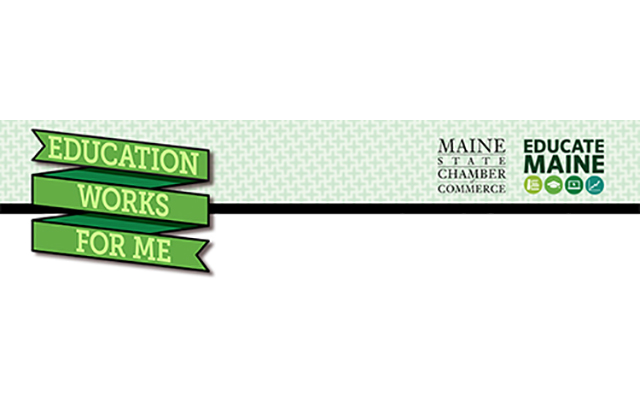Doubling the number of students with CTE experiences by 2020 will benefit students
and Maine businesses facing a ‘skills gap’
PORTLAND, Maine — The Maine State Chamber of Commerce and Educate Maine announced joint strategies for achieving the Maine Department of Education’s goal of doubling Maine career and technical education (CTE) participation by 2020 at an event at the Westbrook Regional Vocational Center Wednesday.
The ambitious strategies and actions are designed to best-serve Maine students who benefit from hands-on, technical and career-focused educational experiences, while benefiting Maine employers who often cannot find the skilled workers they need to succeed and grow.
“Doubling the number of students with career and technical education experience by 2020 will give Maine students the skills they need for the good-paying jobs and careers they want, and at the same time, will help close the problematic ‘skills gap’ so many Maine businesses are facing,” said Deanna Sherman, who chairs the Educate Maine Board of Directors and is President & CEO of Dead River Company. “These strategies and actions will help Maine businesses find the workers we need – who are ready for the job on day one — so we can succeed and grow.”
“An educated and skilled workforce is essential to the prosperity and success of Maine people, Maine businesses, and Maine’s ability to compete regionally, nationally, and globally,” said Maine State Chamber President Dana Connors. “We are committed to the ambitious goals of growing participation in career and technical education to help close both the ‘skills gap’ and the ‘credential gap’ to meet the workforce demands of Maine’s economy today and in the future.”
“CTE has changed dramatically in the last 10 years. It is the perception that CTE is not a viable option for any student that is the biggest roadblock,” said Margaret Harvey, state director of CTE. “The CTE programs are now using mandated industry standards and assessments which allow students to enter the workforce ready and trained. Students are choosing their own pathways to careers that are sustaining and fulfilling for both them and Maine. New legislation will allow more students the opportunity to participate in CTE. It is an exciting time for CTE.”
CTE schools improve outcomes for many Maine students, but are underused. Only 14 percent of Maine high schoolers – 8,505 students – are enrolled in Maine’s 27 CTE high schools this year. The 23 programs offered in Maine’s CTE schools well-prepare students for their careers and/or college. Students choose their own career pathway and learn skills that make education relevant and rigorous. Participating students have a higher high school graduation rate, and the programs are a great help to students from low-income families who often face an opportunity gap.
Strategies for doubling participation in CTE schools by 2020 include updating the public perception of today’s CTE by promoting CTE education through a public-private partnership, exposing more parents and young children to CTEs, offering a one-day course on CTE at CTE schools around the state, and adding a CTE experience to guidance counselor required training. Strategies also include connecting more education foundations, businesses — large and small — and business groups to CTE schools and programs. Dramatically expanding CTE pre-apprenticeships offerings, reinforcing the strength of college and CTE partnerships, eliminating logistical, policy and regulatory barriers, and creating CTE experiences for elementary and middle school students will improve engagement.
The policy brief on strategies to increase participation in CTE in Maine is a partnership between Educate Maine and the Maine State Chamber of Commerce, with generous support from the John T. Gorman and Nellie Mae Education Foundations. For the full report, please go to www.educatemaine.org or www.mainechamber.org/documents/miscdocs/17-029_EDME_CTE-Policy-Brief-FNL.pdf.







